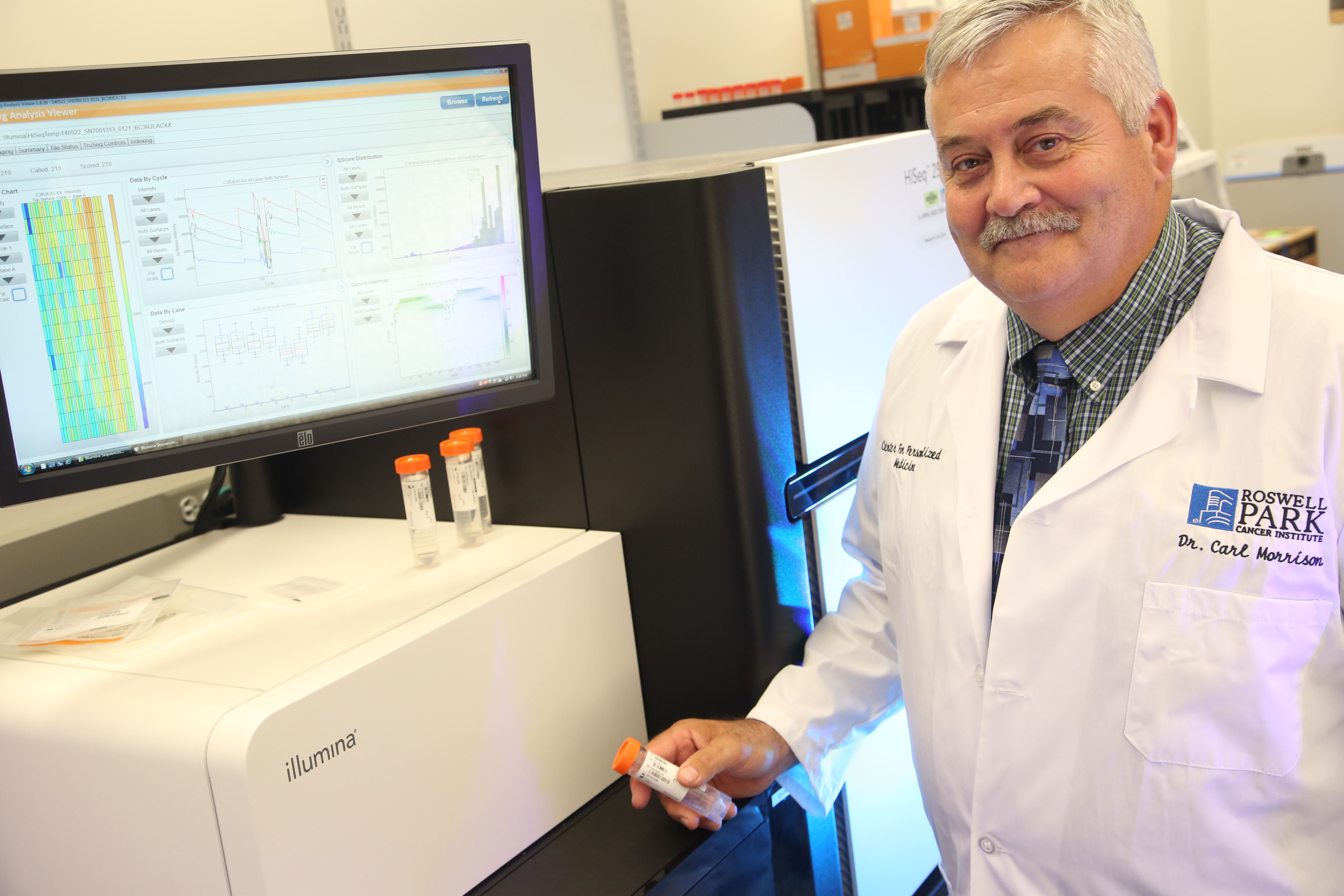By Alan Rosenhoch, Featuring Carl Morrison, MD, DVM
Dr. Carl Morrison is founder, president and chief scientific officer of OmniSeq LLC – a recent Roswell Park Cancer Institute spinoff genomics firm. At Roswell Park, Dr. Morrison continues in his roles as Executive Director of the Center for Personalized Medicine, Clinical Chief of the Pathology & Laboratory Medicine Department, Director of the Molecular Pathology Division, Director of the Pathology Resource Network and Professor of Oncology.
I recently had the opportunity to ask Dr. Morrison a few questions:
Q: What is personalized medicine, and how do you see it changing the way we approach the prevention and treatment of disease?
A: Personalized medicine is the understanding of a patient’s individual genetic profile and using that information to prevent, diagnose, and treat disease. In some diseases, such as cancer, this information is already helping us understand what happened in a cell to cause the cancer and what treatment will give the patient the best chance of a positive outcome with the fewest possible side effects. The potential this approach has in cancer and other diseases, such as diabetes and cardiovascular disease, is endless.
Q: How specifically does OmniSeq’s technology play in the personalized medicine space?
A: For patients diagnosed with certain types of cancer, OmniSeq Precision Medicine Technology unlocks genetic information in the tumor and then matches this information to specific drugs or clinical trials that will best help that particular patient. We’re able to learn about their particular cancer so we know not only which therapies are most likely to be effective, but which ones are not likely to work. That can save precious time for cancer patients, and it cuts down on wasted resources too.
Q: Many nationally recognized cancer institutes across the US are taking advantage of personalized-medicine approaches to fight cancer; what sets Roswell & OmniSeq apart?
A: There are two key elements that distinguish our approach. For one thing, we focused exclusively on testing those genes that are linked to a targeted therapy. OmniSeq testing won’t give oncologists pages and pages of sequencing results they can’t do anything with; it will analyze and report on only those genetic abnormalities that we can match up with a targeted therapy. It’s the only test in the U.S. to be focused exclusively on actionable information. And the other thing that’s unique about OmniSeq is that we use a dual sequencing platform that uses the two primary sequencing approaches in use today to generate reports. That gives us much greater accuracy and sensitivity in our analyses.
Q: What were the largest hurdles you encountered on the road towards commercialization and how were they overcome?
A: There were many hurdles that we had to clear to bring this groundbreaking technology to patients. One of the most significant was ensuring that the technology design and test validation met New York State Clinical Evaluation Program (CLEP) standards – generally accepted as the most exacting standards for diagnostic testing in the nation. Due to the support of Roswell Park and their commitment to the RPCI Center for Personalized Medicine, we built a test that achieved NY CLEP approval in July 2014. This milestone put our company on an accelerated trajectory to commercialization.
Q: What are the next steps in OmniSeq LLC’s development?
A: OmniSeq’s commitment is to bring new hope to patients battling cancer — patients in Western New York and across the United States. We have a team of 21 people today and are aggressively expanding the size of our team to accomplish this objective. The next steps will be expanding OmniSeq testing for patients with colorectal cancer, melanoma, and gradually to all cancers, as new genetic targets are identified and additional targeted therapies developed.
Q: What do you think are Buffalo Niagara’s greatest strengths & assets as they relate to the life sciences industry?
A: We’ve got some outstanding medical research going on at Roswell Park and the University at Buffalo. I love getting together with my colleagues and talking shop – I hear some of the most creative ideas about how to tackle clinical problems, how to get around the survival mechanisms that make a disease like cancer so hard to treat. It helps me stay hopeful about the progress we’ve made. And it’s great to see the Buffalo Niagara Medical Campus expand with new spinoff companies and niche biotech firms to help us do what we do.
Q: What brought you to the Buffalo Niagara region?
A: I came to Western New York 8 years ago because of Roswell Park, one of the premier centers for cancer treatment, research and education in the country. That’s what brought me here. What’s kept me and my family here is good schools and great quality of life, fun activities for our kids. I’m originally from Kentucky, and my family lives on a farm in Chautauqua County. I need my solitude and that connection with animals and the natural world, so I wouldn’t trade living there for anything.
My life works in Buffalo Niagara because in my time here I’ve had the opportunity to build a Center for Personalized Medicine from the ground up and see it bridge out into a spinoff company with enormous potential and enormous opportunity to improve the lives of cancer patients. And my family is happy and thriving here. - Dr. Carl Morrison
______________________________________________
Roswell Park Cancer Institute (RPCI), America’s first cancer center, is dedicated to understanding, preventing and curing cancer. Founded in 1898 by Dr. Roswell Park, the Institute is one of the first cancer centers in the country to be named by the National Cancer Institute as a comprehensive cancer center.


